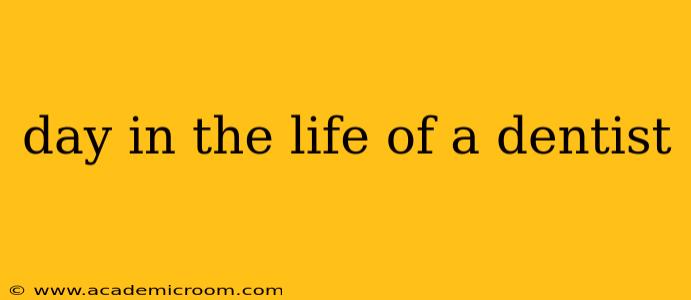The life of a dentist is far from a simple "drill and fill" routine. It's a dynamic blend of precision, patient care, and often, unexpected challenges. This detailed look into a typical day reveals the multifaceted nature of this demanding yet rewarding profession. This isn't just about teeth; it's about building relationships and improving people's overall health and well-being.
What Time Does a Dentist Start Their Day?
A dentist's day doesn't typically begin with the arrival of the first patient. Many dentists arrive at their practice well before the first appointment, often around 7:00 or 8:00 AM. This allows time for several crucial tasks:
- Checking Emails and Scheduling: Responding to patient inquiries, reviewing lab results, and managing the daily schedule are all essential before patient interaction begins. This helps keep the day organized and efficient.
- Team Briefings: A short meeting with the dental hygienists, assistants, and office staff allows for coordination of treatment plans and addressing any logistical issues.
- Chart Review: Reviewing patient charts ensures the dentist is fully prepared for each appointment, understanding the patient's history, treatment plans, and any potential complexities.
- Preparing the Operatory: Setting up the operatory for the day, ensuring all instruments are sterilized and ready for use, and stocking necessary materials streamlines the workflow and ensures a smooth patient experience.
What Does a Dentist Do During the Day?
The core of a dentist's day involves patient care. This can include a variety of procedures:
- Check-ups and Cleanings: These are routine appointments focusing on preventative care, examining for cavities, gum disease, and oral cancer. The hygienist often performs the cleaning, while the dentist oversees the process and conducts a thorough examination.
- Fillings and Restorations: Repairing cavities with composite fillings or other restorative materials is a common procedure. This requires precision and skill to ensure a proper fit and aesthetic result.
- Extractions: Removing teeth, either simple extractions or more complex surgical extractions, may be necessary for various reasons, from decay to orthodontic treatment.
- Crowns and Bridges: Creating and placing crowns and bridges requires collaboration with dental laboratories and meticulous fitting to ensure proper function and aesthetics.
- Root Canals: Treating infected tooth pulp to save the tooth is a specialized procedure that demands significant expertise.
- Cosmetic Dentistry: Procedures like teeth whitening, veneers, and bonding address aesthetic concerns, enhancing the patient's smile.
- Implants: Placing dental implants, which require specialized training, is a significant part of restorative dentistry.
What are the Biggest Challenges Faced by Dentists?
The profession presents unique challenges:
- Physical Demands: The work is physically demanding, requiring precision, dexterity, and prolonged periods of standing or sitting in a specific posture.
- Emotional Demands: Building rapport with patients, managing anxieties, and delivering bad news require strong interpersonal and communication skills.
- Administrative Tasks: Paperwork, insurance claims, and managing the business side of the practice can consume a significant portion of the workday.
- Continuing Education: Staying abreast of the latest advancements in dentistry requires ongoing professional development.
- Emergency Situations: Dealing with unexpected dental emergencies, such as severe pain or trauma, demands immediate action and skillful decision-making.
What Time Does a Dentist Finish Their Day?
A dentist’s workday extends beyond the last patient appointment. Depending on the practice's size and the dentist's schedule, it might end anywhere from 5:00 PM to 8:00 PM or even later, including time for:
- Charting and Documentation: Meticulous record-keeping is crucial for legal and medical reasons.
- Sterilization and Cleanup: Maintaining a sterile environment is paramount for patient safety.
- Scheduling and Planning: Preparing for the next day’s appointments and managing the overall practice flow.
How Many Hours a Day Does a Dentist Work?
The average workweek for a dentist is around 40-50 hours, but this can fluctuate significantly. Some dentists work longer hours, especially those in private practices, while others might have a more structured schedule.
What are the Different Types of Dentists?
Dentistry offers specialization, leading to diverse career paths:
- General Dentists: Provide a wide range of services.
- Pediatric Dentists: Focus on children's oral health.
- Orthodontists: Specialize in straightening teeth.
- Endodontists: Focus on root canals.
- Periodontists: Specialize in gum disease.
- Oral Surgeons: Perform surgical procedures in the mouth.
- Prosthodontists: Specialize in replacing missing teeth.
What is the Work-Life Balance Like for a Dentist?
Achieving a healthy work-life balance can be challenging for dentists due to the demanding nature of the profession. However, many dentists successfully integrate their professional and personal lives through careful time management and planning. This might involve delegating tasks, employing efficient scheduling, or setting clear boundaries between work and personal time.
This provides a comprehensive overview of a day in the life of a dentist, highlighting the variety, challenges, and rewards of this important profession. The dedication and skill required to excel in this field contribute significantly to the well-being of patients and the broader community.
